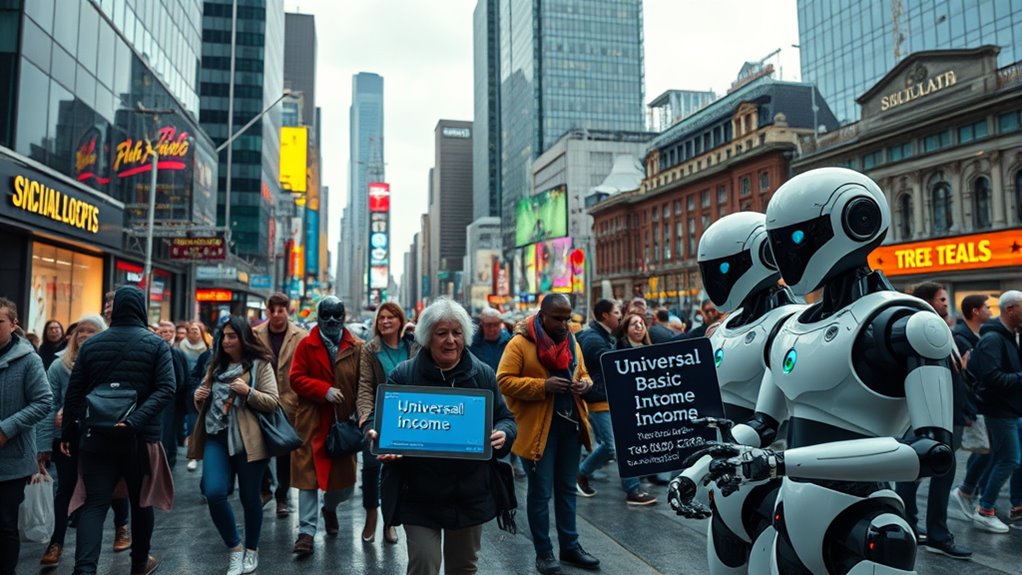As robots and automation take over more jobs, especially low- and middle-skill roles, you’ll likely need a safety net like UBI to stay afloat. It provides income stability during shifts, supports retraining, and encourages entrepreneurship. Evidence shows UBI helps communities and individuals adapt better to these changes with less stress and more opportunity. If you want to understand how UBI could become essential in a robot-driven world, keep exploring these key points.
Key Takeaways
- Automation is displacing jobs across industries, increasing the need for a safety net like UBI to ensure economic stability.
- UBI supports workers’ retraining and adaptation amid rapid technological change and automation-driven workforce shifts.
- As robots boost productivity but threaten employment, UBI offers unconditional income to reduce poverty and income inequality.
- Evidence from pilots shows UBI improves financial security, mental health, and social cohesion during economic transitions.
- The high costs and resource challenges of implementing UBI highlight the importance of policies that sustain long-term economic resilience.
The Growing Role of Automation and Its Impact on Employment

Automation is rapidly transforming the job landscape, with most employers recognizing its potential to reshape industries by 2030. You’ll see AI and information processing cited by 86% of employers as key drivers of change, while 58% highlight robotics and automation as transformative forces. Already, 14% of workers have experienced job displacement due to these technologies. Employers expect digital access to become the most significant trend by 2030. In specific sectors, automation leads to job cuts—tech layoffs hit a record high in 2023, and roles like medical transcriptionists and customer service reps are projected to decline. Despite these shifts, some occupations, such as personal financial advisors, are expected to grow. Automation boosts productivity and can improve job satisfaction by reducing repetitive tasks, but overall, it’s reshaping employment patterns across industries. Current impact shows 14% of workers have experienced job loss due to automation or AI. The ongoing advancement of technological disruption underscores the need for policies like Universal Basic Income to support displaced workers and adapt to the evolving automation landscape. Additionally, the increasing deployment of modern heat pumps with quieter operation and better indoor air quality illustrates how technological innovations can also contribute to improving living environments amidst societal changes. As the scope of automotive tuning expands with new technologies, workers and industries must adapt to these ongoing changes. Moreover, fostering reskilling programs can help prepare the workforce for future demands and technological shifts.
Evidence From UBI Pilots: What Do the Results Tell Us?

Evidence from UBI pilots offers valuable insights into how guaranteed income affects individuals and communities. You see, these pilots reveal that UBI can improve financial stability, mental health, and social cohesion. For example, in Kenya, recipients faced less food insecurity during crises and reported better health. Similarly, in Pittsburgh, over half felt financially better off after five months, using funds for bills, savings, and debt reduction. These results suggest UBI encourages entrepreneurial efforts and maintains or boosts employment levels. Psychologically, recipients experience less stress and greater confidence, leading to improved well-being. Additionally, the increased fiber intake from UBI funds can support better digestion and overall health. Moreover, engaging with transformative quotes can inspire recipients to pursue personal growth and resilience amid economic challenges. Recognizing the importance of cultural identity can also help individuals build stronger community ties and foster resilience. Incorporating elements of mindfulness and self-reflection can further enhance recipients’ emotional well-being and adaptability.
How UBI Could Serve as a Safety Net in a Robot-Driven Economy

As automation displaces jobs, you need a reliable safety net to stay secure. UBI provides income support during shifts, helping you maintain stability as the economy shifts. This ongoing safety measure guarantees you can adapt and find new opportunities without falling into hardship. Furthermore, the rise of AI-driven workflows means many traditional roles are becoming obsolete much faster than before, emphasizing the urgent need for such safety nets, especially as automation systems in automation systems improve, making machines more capable of replacing human labor. Recognizing the rapid development of advanced sprayers and other tools underscores the importance of financial security measures like UBI in a changing job landscape.
Income Security Amid Automation
Have you ever wondered how society can maintain financial stability as robots increasingly take over jobs? UBI offers a solution by providing unconditional income, ensuring basic needs are met. It reduces poverty and income inequality by acting as a safety net. As automation displaces workers, UBI can help stabilize the economy and maintain consumer demand. While no country has fully adopted UBI, many are testing partial systems to gauge its impact. Implementing UBI involves significant costs, but it could:
- Boost consumer spending
- Reduce financial stress
- Support health and education outcomes
- Serve as a buffer during economic transitions
Additionally, the safety features of electric heated mattress pads, such as auto shut-off, demonstrate how technology can enhance security in everyday devices. Universal Basic Income can also encourage economic resilience by giving individuals the security to pursue new ventures without the immediate pressure of financial survival. Incorporating sound design techniques into the development of UBI-related media campaigns can enhance public understanding and engagement.
Supporting Transition to Work
With automation rapidly transforming industries, many workers face sudden job losses and financial uncertainty. UBI acts as a safety net, providing stability during workforce disruptions. It helps you stay afloat while searching for new opportunities or retraining. UBI also reduces the risk associated with learning new skills, enabling you to pursue certifications or education without fear of losing income. Here’s how UBI supports your changeover:
| Benefit | Impact | Examples |
|---|---|---|
| Buffer during layoffs | Prevents poverty and hardship | McKinsey study on financial safety |
| Funding retraining | Facilitates upskilling | Real estate licensing example |
| Reducing job barriers | Eases entry into new careers | Covering transportation costs |
| Maintaining productivity | Encourages continued work with flexibility | Slight reduction in hours observed |
| Psychological support | Lessens anxiety, boosts confidence | Increased resilience in transitions |
| Economic stability | Provides a foundation during transitions | Supporting research shows that recipients of UBI experience less financial stress during job changes. Additionally, UBI can help mitigate income inequality by providing consistent support regardless of employment status. A stable income baseline can also promote community well-being by fostering stronger local economies. Natural elements and eco-friendly DIY decorations can further enhance community spirit and shared experiences during these times. |
Debates: Does UBI Encourage Laziness or Foster Entrepreneurship?

Does providing a universal basic income (UBI) encourage laziness or stimulate entrepreneurship? Evidence suggests UBI boosts entrepreneurial activity by increasing interest in starting businesses, especially among lower-income groups. It offers financial resilience, enabling you to take risks and invest in business materials. Recipients often use UBI for business expenses and see significant growth in enterprise revenues. UBI also encourages better financial decision-making and investment, fostering a proactive mindset. Recent studies indicate that UBI can lead to sustained business growth and innovation. UBI increases interest in business creation. It provides a safety net for high-risk ventures. Recipients tend to diversify and grow their businesses. Studies show UBI leads to more investment, not idleness. Far from promoting laziness, UBI empowers you to pursue productive, entrepreneurial efforts.
Designing UBI for Maximum Effectiveness in a Changing World

As the world rapidly changes due to technological advances and economic shifts, designing a UBI system that remains effective requires careful planning and adaptability. You need to contemplate how UBI can boost economic growth by encouraging consumer spending, increasing employment, and supporting local economies. Incorporating flexible funding models—like progressive taxes—can help manage costs while ensuring sustainability. To maximize its benefits, UBI should also promote education and skill development, enabling recipients to adapt to evolving job markets. Additionally, UBI’s role in reducing poverty, improving health, and fostering social cohesion must be prioritized. By tailoring programs to specific community needs and remaining open to adjustments, you can create a resilient, impactful UBI system that effectively addresses the challenges of a rapidly changing world. A well-structured UBI can also adapt to economic fluctuations and technological disruptions, ensuring continuous support for all.
Addressing Concerns and Limitations of Basic Income Policies

Implementing a Universal Basic Income UBI) raises significant concerns about costs and resource allocation. The expense is enormous, with a $12,000 annual UBI costing around $2.4 trillion—nearly one-eighth of the U.S. GDP. You might find that funding options, like higher taxes or reallocating existing welfare funds, are politically challenging. furthermore, because UBI is universal, it could divert resources from those who need it most, such as poor families and single parents.
Implementing UBI faces huge costs and risks diverting resources from vulnerable populations.
- High costs compared to current safety nets
- Potential reduction in labor participation and economic growth
- Risk of losing essential benefits like SNAP or Medicaid
- Funding and political resistance to large-scale implementation
Frequently Asked Questions
How Sustainable Is UBI Funding in a Highly Automated Economy?
You might wonder how sustainable UBI funding is in a highly automated economy. While models like sovereign wealth funds and tech sector taxes can provide steady income, market volatility and automation uncertainties pose risks. To keep UBI viable, you’ll need diverse funding sources, smart policies, and continuous adaptation. Relying on a single source isn’t enough; a resilient, flexible approach helps guarantee long-term support for everyone.
Can UBI Effectively Address Income Inequality Caused by Automation?
You wonder if UBI can truly tackle income inequality from automation. It can help by providing a safety net, ensuring everyone has a minimum standard of living despite job losses. UBI encourages economic stability, reduces poverty, and gives you the freedom to pursue meaningful work. While it won’t eliminate inequality entirely, it’s an essential tool to support society through technological changes and protect vulnerable populations.
What Are the Long-Term Social Effects of Widespread UBI Adoption?
You’ll see long-term social effects like reduced poverty and inequality, as UBI provides ongoing financial stability and access to healthcare, education, and better nutrition. It encourages entrepreneurship and lifelong learning, boosting productivity and innovation. Social cohesion improves as financial stress decreases, leading to less crime and social unrest. Overall, widespread UBI fosters a more equitable, healthier society where people have the freedom and resources to thrive over the long run.
How Do Cultural Differences Influence UBI Implementation and Acceptance?
You should recognize that cultural differences markedly influence UBI acceptance and implementation. In societies with strong work ethics and high employment commitment, people tend to resist UBI, viewing paid work as central to social worth. Conversely, regions with weaker productivity norms or higher economic needs are more open to UBI. Tailoring policies to fit local cultural values can improve acceptance, making UBI more effective and sustainable across diverse societies.
Are There Alternative Policies to UBI for Managing Automation’S Impact?
You should consider that there are several alternatives to UBI for managing automation’s impact. Targeted income support directs funds to those most affected, while job guarantee programs ensure employment for displaced workers. Robot taxes can help fund social programs, and education initiatives prepare workers for new roles. These options can be more fiscally sustainable and politically feasible, offering tailored solutions without the broad costs and complexities of universal schemes.
Conclusion
As robots rise and jobs shift, you face a future of uncertainty and opportunity alike. You can embrace UBI as a safety net, a spark for entrepreneurship, and a cushion against change. You can see it as a foundation for stability, a platform for innovation, and a shield against insecurity. In this evolving world, your choices shape resilience, your mindset fuels progress, and your willingness to adapt determines whether you thrive or fall behind.









